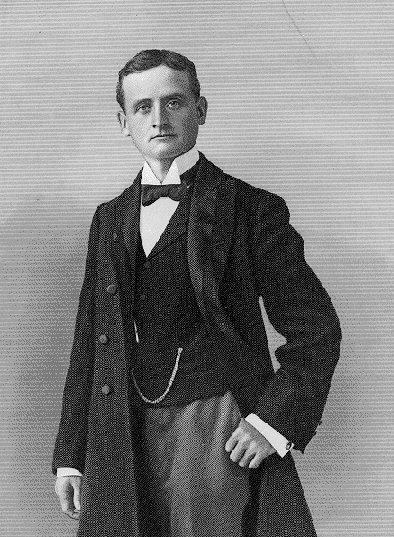John Fitzgerald (John Francis Fitzgerald)

John Fitzgerald was born in Boston to Irish businessman/politician Thomas Fitzgerald (1830–1913) of Bruff, County Limerick, and Rosanna Cox (1833–1923) of County Cavan. He was the fourth of twelve children. Both of his sisters, Ellen and Mary, and his eldest brother, Michael, died in infancy. Fitzgerald’s brother Joseph had severe brain damage from malaria and barely functioned. Only three of the children survived in good health. Fitzgerald’s mother died when he was sixteen. His father wished for him to become a doctor to help prevent future tragedies of the sort that had marred the Fitzgerald family. Accordingly, after being educated at Boston Latin School and Boston College, he enrolled at Harvard Medical School for one year, but withdrew following the death of his father in 1885. John Fitzgerald later became a clerk at the Customs House in Boston and was active in the local Democratic Party. Fitzgerald was a member of the Royal Rooters, an early supporters’ club for Boston’s baseball teams, particularly its American League team, the modern Boston Red Sox. At one point, he was the group’s chairman, and threw out the ceremonial opening pitch in Fenway Park’s inaugural game (April 20, 1912), as well as in the 1912 World Series later that year. His great-granddaughter Caroline Kennedy threw out the first pitch for Fenway Park’s 100th anniversary on April 20, 2012.
John Fitzgerald was elected to Boston’s Common Council in 1891. In 1892, he became a member of the Massachusetts Senate, and in 1894, he was elected to Congress for the 9th district, serving from 1895 to 1901. In 1906, Fitzgerald was elected Mayor of Boston, becoming the first American-born Irish-Catholic to be elected to that office. Fitzgerald served as mayor of Boston from 1906 to 1908, was defeated for re-election, but returned to the office again from 1910 to 1914. Of his stylish manner, Robert Dallek wrote: “He was a natural politician—a charming, impish, affable lover of people….. His warmth of character earned him yet another nickname, “Honey Fitz,” and he gained a reputation as the only politician who could sing “Sweet Adeline” sober and get away with it. A pixie-like character with florid face, bright eyes, and sandy hair, he was a showman who could have had a career in vaudeville. But politics, with all the brokering that went into arranging alliances and the hoopla that went into campaigning, was his calling. A verse of the day ran: ‘Honey Fitz can talk you blind / on any subject you can find / Fish and fishing, motor boats / Railroads, streetcars, getting votes.’ His gift of gab became known as Fitzblarney, and his followers as “dearos,” a shortened version of his description of his district as ‘the dear old North End.'” Early in his first term as Boston’s mayor, John Fitzgerald formulated a plan to revitalize the commercial importance of the city. Using the slogan “A bigger, busier and better Boston”, Fitzgerald was able to persuade business and the Massachusetts legislature to invest $9 million for improvements to the port by 1912. Within a year, the investments began to pay off in the form of new port traffic to and from Europe.
John Fitzgerald was for years the most prominent political figure in the city of Boston, where Patrick Joseph “P. J.” Kennedy was a more behind-the-scenes Democratic Party figure. P. J. opposed Honey Fitz when the latter first ran for mayor, but they later became allies. In 1914, these two powerful political families (Kennedy and Fitzgerald) were united when P. J.’s elder son Joe married Fitzgerald’s eldest daughter Rose. From March 4, 1919, to October 23, 1919, he again served in Congress, now for the 10th district, until Peter F. Tague successfully contested the election. Fitzgerald was an unsuccessful candidate for the offices of Senator in 1916 and Governor in 1922. His opponent for the Senate was Henry Cabot Lodge. In 1942, he ran a quixotic campaign for the U.S. Senate, and lost the Democratic primary to Congressman Joseph E. Casey. In his later years, Fitzgerald focused on his business interests and on honing the political instincts of his daughter Rose’s promising sons. In 1946, when John Fitzgerald “Jack” Kennedy decided to run for Congress, 83-year-old Honey Fitz helped him plan his campaign strategy. At the victory celebration, Fitzgerald danced an Irish jig, sang “Sweet Adeline,” and predicted that his grandson would someday occupy the White House. Shortly after his election to the presidency, President Kennedy renamed the presidential yacht the Honey Fitz in honor of his maternal grandfather.
On October 2, 1950, John Fitzgerald died in Boston at the age of eighty-seven. His funeral was one of the largest in the city’s history. President Harry S. Truman sent his sympathies and Fitzgerald’s pallbearers included U.S. Senator Henry Cabot Lodge II, U.S. Senator Leverett Saltonstall (the grandson of the man who had given “Honey Fitz” his first job), future U.S. Speaker of the House John McCormack, Massachusetts Speaker of the House Thomas Phillip O’Neill, Jr., and former Boston Mayor and Massachusetts Governor James Michael Curley. As “Honey Fitz” was carried to his final rest from Holy Cross Cathedral to St. Joseph Cemetery in West Roxbury, Massachusetts, a crowd of thousands who had gathered along the streets sang “Sweet Adeline”.
Born
- February, 11, 1863
- USA
- Boston, Massachusetts
Died
- October, 02, 1950
- USA
- Boston, Massachusetts
Cemetery
- Saint Joseph Cemetery
- West Roxbury, Massachusetts
- USA

